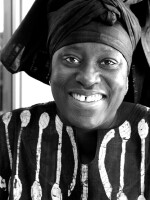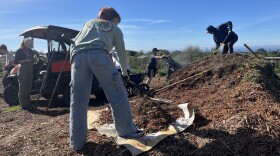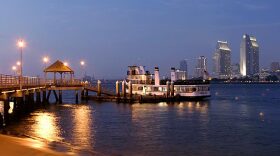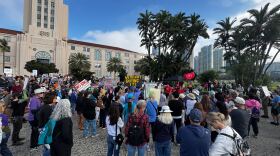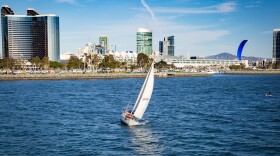



After another deadly week of violence in Kenya, international diplomatic efforts continue to try to end the bitter crisis prompted by a disputed presidential vote. The latest in a procession of high-profile would-be peace brokers is former United Nations Secretary-General Kofi Annan, who arrived in Kenya on Tuesday.
More than 650 people have been killed in the violence, and a quarter of a million have been driven from their homes in different parts of the country — including the capital, Nairobi.
Displaced people are camped outside Moi air force base, across the street from one of Nairobi's biggest slums, Mathare. That shantytown and Nairobi's biggest slum, Kibera, are considered flashpoints and potential tinderboxes. If there is trouble, it is almost always reflected in these multi-tribal shanties, where the different ethnic groups live cheek by jowl — generally peacefully — until problems like this erupt.
In Mathare, relief workers hand out provisions, including beans and gray blankets to help in the cool Nairobi summer evenings and unseasonal rain. Hundreds of expectant, displaced Kenyans are jostling one another as a man stands on top of a vehicle shouting out a list of names.
Among the displaced people desperate for assistance is Mary Akinyi Ndar, a mother of five from the Mathare slum. She is disappointed — her name is not on the list.
Ndar was forced from her shanty home by men with machetes barking threats. She didn't recognize them, she says. Some people with small children tried to resist, but the attackers brandished their machetes and a few people were cut.
A Tribal Conflict
Ndar is a Luo, the same tribe as Kenya's opposition leader, Raila Odinga. He insists he is the rightful president — that he was robbed of victory in a rigged election.
Odinga is demanding a vote recount or a new election. The tense political standoff between Odinga and President Mwai Kibaki, a Kikuyu, has sparked weeks of ethnic bloodletting. It has allowed grievances over land and privilege that date back decades to resurface.
Now rivals are using machetes, daggers, spears and bows and arrows to settle scores. Dozens of people have been burned alive in tribal violence. Riot police are cracking down on opposition supporters who have defied a ban on anti-government protest rallies, creating a murderous mix.
"The way I see it, this is not really a political problem," says Joyce Oneko, a counselor who heads the aid agency Mama and Dada Africa, which means "Mothers and Sisters Africa." "The politics have just helped to bring things which were already there to the fore. So they've now actually had the opportunity to vent out the anger that they've been having."
Oneko is organizing the handout of relief stocks near the slum. She says the politicians are responsible for Kenya's current woes because of the way they campaigned in the run-up to the elections.
"I am blaming the politicians because when we were doing the campaign, it was very clear that the politicians were working on their own tribesmen," she says. "The Luos were campaigning for the Luos, the Kikuyus were campaigning for the Kikuyus. ... So I am blaming this on the politicians, because if the politicians talk to their various followers and make them see that as Kenyans, we are all Kenyans — it is not about tribe — they will follow, because in this country people do follow their leaders."
Diplomatic Efforts Continue
There is still a huge gulf between Kibaki and Odinga — and the two men aren't talking. Since violence erupted in Kenya after the disputed election results were declared late last month, there has been a steady stream of international figures trying to calm the waters, including Nobel Peace Prize laureate Desmond Tutu and the African Union chairman, President John Kufuor of Ghana.
The opposition has been demanding that Annan come to help. The government says he is welcome but has resisted any formal outside mediation, saying Kenya is not at war, nor in crisis.
But what Ndar, the displaced Mathare slum dweller, says she wants most is peace. No one doubts Annan has a tough mission ahead of him.
Copyright 2022 NPR. To see more, visit https://www.npr.org. 9(MDAzMjM2NDYzMDEyMzc1Njk5NjAxNzY3OQ001))



